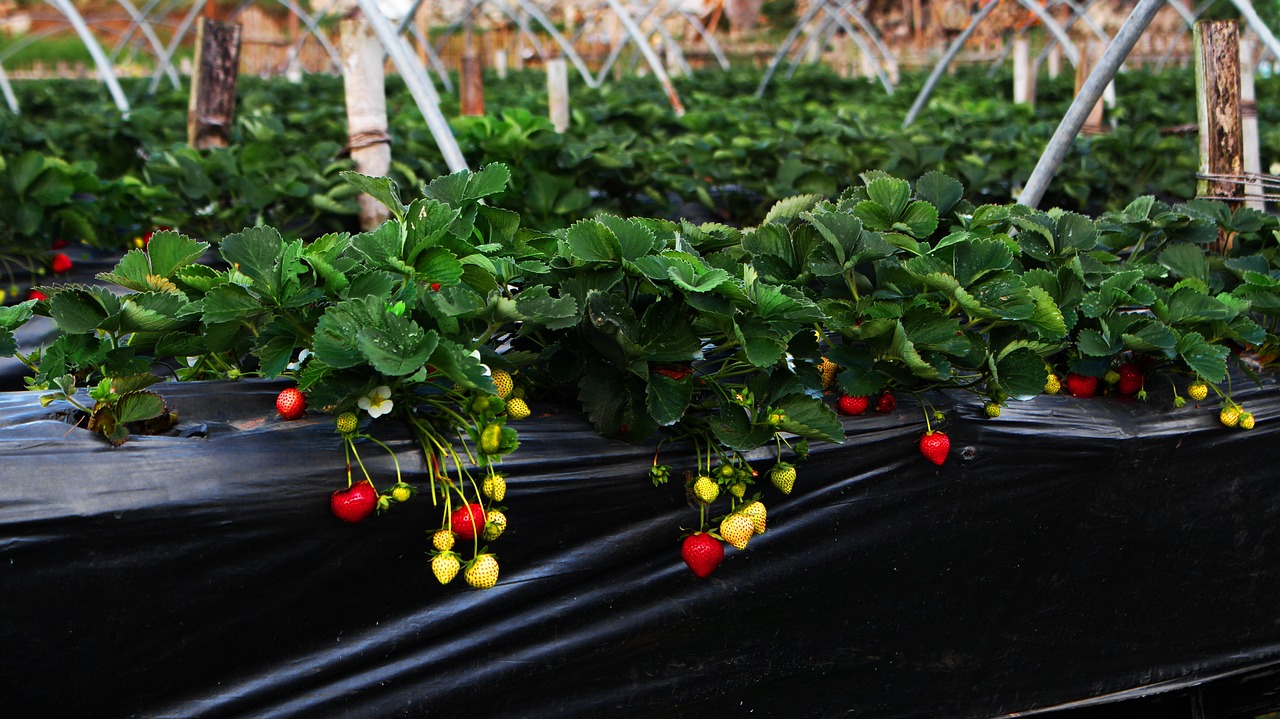Nepalese workers in the farms of Kent are doing more than just fruit picking. While getting abused by their employers, they are finding solace in learning new farming skills, but how long will they be able to hold on?
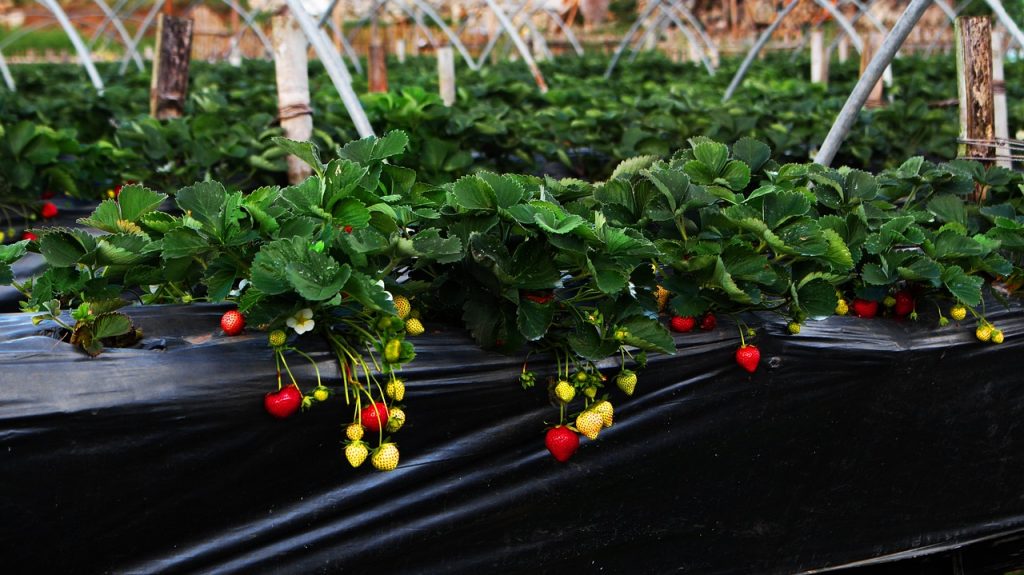
Tiny berry farms located in the secluded countryside of Kent, Manish, along with his friends made their way to one of the farms. As the doors of the farm lifted, the quiet fields were filled with laughter and murmurs of people. Since the last four months, Manish had gone from hating to genuinely enjoying what he did, fruit picking.
“I dreaded coming here initially and always wanted to run away but due to financial hardships, I had to stay and that thinking made all the difference,” said Manish Chettry from Pokhara.
Manish, a 26-year-old, came to the UK as a seasonal agricultural worker. He had recently come back from South Korea, working in the manufacturing sector.
He said: “The idea of going to Britain was quite appealing to me. After my friends went there, I thought of it as a feasible pursuit.”
“As I had been working in Korea for more than four years making huge carton boxes and manufacturing tapes, I was ready to pick berries in the UK.”
Manish had set his mind to face any challenges that came along his way. He knew staying in Nepal would not do him any good as there were no opportunities available for skilled workers.
“I can repair mobile phones and I learned this skill in Gongabu, Korea but there is no demand for skills like this in Nepal”, he said.
Mr Chettry used his savings from Korea to apply for a seasonal worker visa in the UK. The experience he had gained made him mentally prepared for any type of work.
“As I had anticipated, my work was to pick all types of berries: strawberries, blackberries, blueberries, and raspberries”, he said.
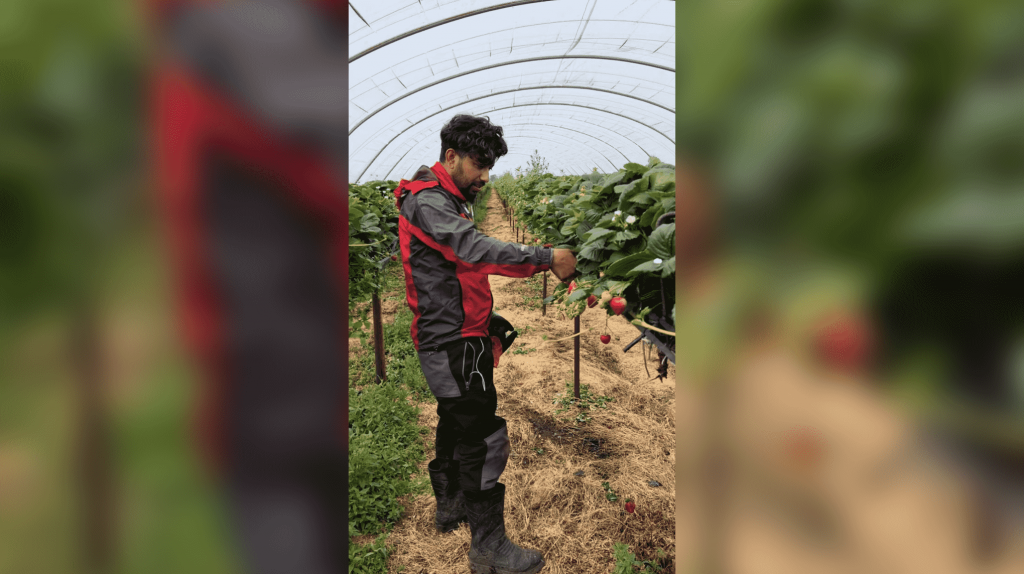
“My days would start at 4 am and we would get paid by the amount of fruit we picked up so, I would spend most of my time at the farm picking berries from ground to table-top.”
Mr Chettry stayed in a caravan which was located on the border of the farm. He would share that room with seven other men from Nepal. The living conditions were not the best as they did not have clean water or heaters.
“It would get quite chilly at night and in the morning. The heaters wouldn’t work and the water provided to us was not clean. Cold wind would blow from the vents quite often,” said Mr Chettry.
“We would daily complain about our living situation and our managers would not do anything about it. One time they came for an inspection and left saying some steps are being taken.”
Every year since 2019, thousands of workers come to work in the UK on a six-month seasonal agricultural visa route. After the UK voted to leave the European Union, the seasonal worker scheme was launched to cover anticipated labor shortages.
An investigation was launched by The Bureau of Investigative Journalism which found reports of migrant workers facing greater levels of exploitation than ever.
A Home Office spokesperson said: “The welfare of seasonal workers is of paramount importance, and we are clamping down on poor working conditions and exploitation.
“The seasonal workers’ route has been running for four years and every year improvements have been made to stop exploitation and prevent poor working conditions while people are in the UK. We will always take decisive action where we believe abusive practices are taking place or the conditions of the route are not met.”
Despite the conditions, Mr Chettry did not give up. He decided to make Tiktok videos to record his experience and guide people who wanted to come work on the British farms.
“My TikTok videos would do quite well, and a lot of my followers started relying on me for information about the application process and life in the UK. The craze to work in the UK among Nepalese people is next level and due to this, a lot of them get trapped by fraud recruiters”, he said.
“With the littlest of time I had, I would try to address common questions and even research during my free time. That’s when I realized, we are being exploited as these working and living conditions are not normal.”
A recruitment agency in Nepal called Wide-Space International has been reaching out to workers and many families in rural Nepal to educate them about ethical recruitment.
“The recruitment system in Nepal preys on the desperation of individuals seeking employment and hence, they exploit this vulnerability by setting higher fees for recruitment.”
“Agencies should adopt innovative solutions, embrace technological advancements, and commit to ethical practices but more than anything, they should preach people before profit.”
Mr Chettry believes that working in the UK is a good opportunity for Nepalese people and as reports of malpractice in the recruitment process are being reported, the hiring of employees would become transparent.
He said: “Despite all the suffering if you are honest with your work and honor your contract, it can increase the opportunity to be rehired in the UK.”
“One of my employers has asked me to reapply for the same route and I might come back and work for him. The work is not easy, and I tell this to my viewers as well. When I decided to come here, I was both mentally and physically prepared.”
Mr Chettry says many of his friends were inspired by his attitude of not giving up and focusing more on learning techniques of farming.
“I thought either I could cry about my situation, or I could make something positive out of it, so I took notes of everything the farm taught me.”
“I even learned new ways to save new plants rather than leaving them to die,” he said.
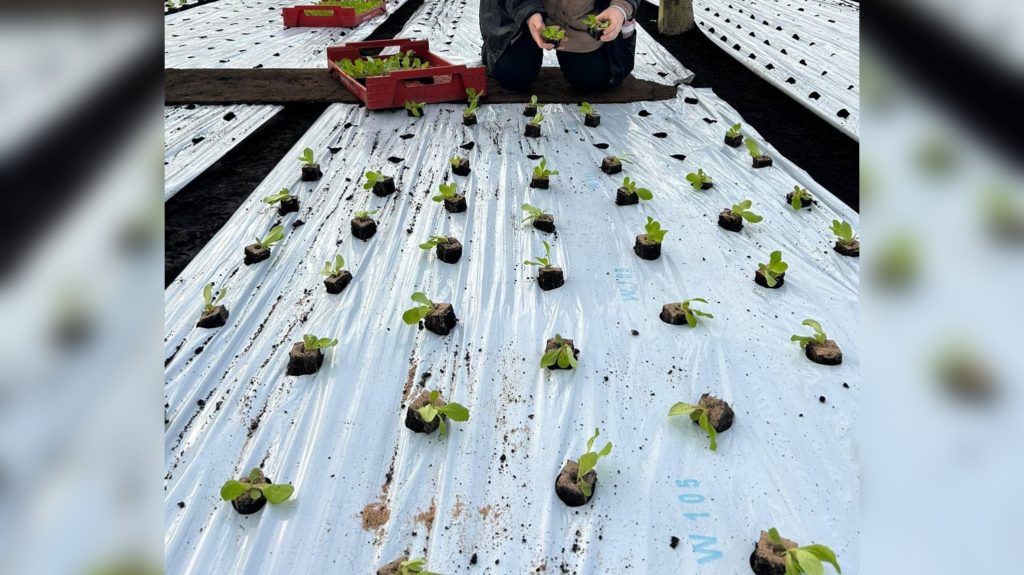
On average, Mr Chettry would earn £80 daily and his accommodation would deduct some money separately.
He added: “I am sure farmers in rural Nepal would thrive in an opportunity like this but due to the complicated recruitment process and unethical behavior of agents, those farmers would never be able to reach here.”
“I wish I could highlight some of the issues via my TikTok and give new ideas that some of the farmers could use back home.”
Mr. Chettry says he believes a lot of the problem lies in how there is no information available for the public to consume in their mother tongues.
“Not everyone understands English especially farmers from rural Nepal. The government of the UK says workers have to pay a £259 fee to apply for a seasonal worker visa and it requires no special skills.”
“If only people would get the same information in their mother tongues, I am sure a lot of them would be able to save themselves from getting cheated by recruiters”, he said.
In 2022, The Guardian’s investigation revealed how Indonesian workers were being charged £5000 to secure employment under the seasonal worker visa scheme.
Mr Chettry recalls how his friends in the Kent farm had paid extra illegal fees unknowingly to their agents.
He said: “My friends here were also quoted hefty fees by brokers in Kathmandu. I always ask, why is it important to use such agents?”
Joy Stephens, a social researcher who works in Nepal with various rural empowerment projects thinks that the seasonal worker visa is a brilliant opportunity for impoverished rural farmers from Nepal.
She said: “It is a great opportunity, and the Nepalese government should provide free assistance to these farmers with the application.”
“Applicants should be well informed of their rights and once they are in the UK, they should be aware of their labor rights. There are ways to report complaints here so government should provide that information to them.”
Joy added that a lot of the farms in the UK are secretive about their operations and would not entertain outsiders being on their farms.
“One would think they are growing nuclear bombs, not berries. What are they trying to hide? Are they safe-guarding migrant workers or are they afraid of some workers speaking up”, she said.
A report published by David Neal, former chief inspector of borders and immigration, stated that the Home Office continued to expand the scheme despite strong evidence of worker exploitation being available.
The report also outlined recommendations where a thorough review of the seasonal worker route was needed.
Earlier this year, two visa scheme operators were sent to the House of Lords to give statements on how only one percent of their workers had made complaints about the working conditions.
The investigation led by The Bureau of Investigative Journalism (TBIJ) reported that the visa scheme operators are required to ensure participants are properly paid, treated fairly, and live in hygienic accommodations. Despite the numerous issues raised with the inspectors, no government-licensed scheme operator has lost its license or been sanctioned for failing to meet these standards. Some have, however, been penalized when workers stayed in the UK beyond the end of their visas.
A Labour MP for Hayes and Harlington showed his support to track down the exploitation of migrant workers in the UK via X, formerly known as Twitter.
The statement read: “The exploitation faced by migrant workers at the hands of often brutal, profiteering employers verges on modern-day slavery. We urgently need comprehensive, strong legislation & enforcement to tackle this stain on our economy.”
Back in the farms of Kent, Mr Chettry left the UK for good and is planning to stay back in Nepal for some years.
He said: “After my visa expired, a lot went down and many agencies in Nepal were shut as they were actively involved in illegal activities.”
“I am hoping to stay back in Nepal and buy lands from the money I earned in the UK. No matter the experience, I am glad I had the chance to go there, and I came back learning many tips and tricks for my farms.”
“As I enjoy traveling, I am also thinking of going to rural parts of Nepal and imparting my knowledge about farming and recruitment agencies to the people who are interested,” he said.
Mr Chettry shares how a lot of people in the farms were unaware of them getting exploited.
He said: “A lot of my friends at the farm had no clue what exploitation is and that we were one of the victims of exploitation.”
The TBIJ’s investigation showed how unpaid work was common. In almost two-thirds of farms that were inspected by the Home Office in 2021 and 2022, workers complained about how they were not paid for some of the hours they worked, took sick leaves, or faced deductions beyond the maximum allowed by law.
In most of the farm inspections carried out by the Home Office, people reported employers mistreating them. This included bullying, being publicly humiliated by managers, and racist remarks being thrown at them.
The TBIJ reported that when workers made complaints, some were ignored or told they could leave the farm and go back to their home countries.
Atit Lama, 28, who worked in the farms of Gloucestershire picking strawberries felt his supervisors throwing racist remarks at him while working.
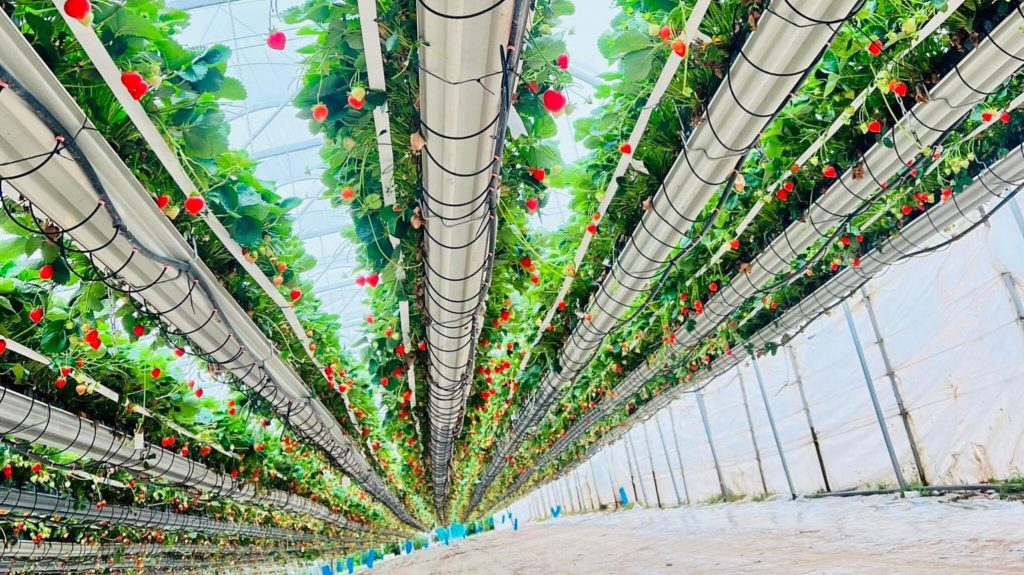
He said: “Employers often think we don’t understand English so they would throw racist slurs at us.”
“One time, I caught one of my supervisors saying bad about my friends and I had to pretend that I did not understand it or else, I know they would be cutting my pay for the day.”
Atit always feared to take any steps as he did not want to get blacklisted from work. In his farm, people were easily sent back to their caravans if they did not carry enough bags or picked enough strawberries.
“I always refrained from saying anything. I had a huge responsibility on my shoulder and had to look after my bedridden parents back home, I could not risk my job.”
“Later at night, our friends would talk about how some of the supervisors don’t even let us take breaks. When I think about it now, I often wonder how I survived that because it was brutal,” he said.
Atit added: “After I came to Nepal, I was still in contact with some of my friends who would tell me stories of how the supervisors would dump extra work on people who would question the harassment.”
“You had to be there to see all the discrimination we faced,” he said.
Many Nepalese men got trapped in the maze of promises given by unethical recruitment agents and mostly third parties who would take their share of the profit and leave the migrant worker alone.
But in one of the firsts, Emiliano Mellino, a journalist for TBIJ helped a Nepalese woman who was underpaid by nearly £1500 by a farm in the UK.
Sapana Pangeni is the first person on a seasonal worker visa scheme to take her bosses to an employment tribunal. She hired lawyers after Emiliano’s help and now she is arguing that she suffered indirect discrimination at work.
Emiliano wrote on X, former Twitter: “I commend her courage as she stands her ground on what she believes in. I have spoken to hundreds of workers and a lot of them hesitated to share their story with me.”
“Sapana is determined to hold her bosses accountable for the discrimination she faced at work. In one of the emails, she shared with us that she had written to her boss: “It is getting harder to pay for groceries and living expenses… I am working here under frustration and very bad working conditions.”
Emiliano also said how other Nepalese women came forward to share their stories after Sapana shared her plight with them.
He said: “Another Nepalese woman reached out saying she was paid only £16 for a day.”
“There are many reasons why workers do not want to come forward, or when they do, they do not want to be named. Some workers are fearful that employers will fire them from their jobs and make them return to their countries of origin. Others are worried that if they speak out, they will not be allowed to return to the UK.”
“In some instances, workers are worried that they will be labeled a troublemaker and will have difficulty getting jobs in the future”, he said.
Emiliano, who is an immigrant says he feels it’s important for him to use his position as a journalist to act in solidarity with other immigrants.
He said: “Throughout 2021, I came across many labor rights and human rights experts who said that the design of the seasonal worker visa scheme was putting workers at huge risk of exploitation and that the government was not properly addressing these concerns. At the same time, there was a strong push from the farm owners’ lobby for the government to further expand the scheme. So, the combination of a highly risky scheme which was expanding without safeguards being put in place presented a unique reporting opportunity.”
“Workers are often living at their place of work, far from urban centers and many do not speak English, so it can be difficult for them to communicate with us. Some of the workers I met have made peace with the treatment they are receiving from their bosses and don’t want to speak up but on the other hand, we also have workers like Sapana.”
“At a more personal level, I am an immigrant. While I have not faced the levels of exploitation nor the precarious immigration status these workers have faced, I feel it is important for me to use my position of relative privilege to act in solidarity with other immigrants,” he said.
*Statements from TBIJ and Wide Space International are taken by their websites.
